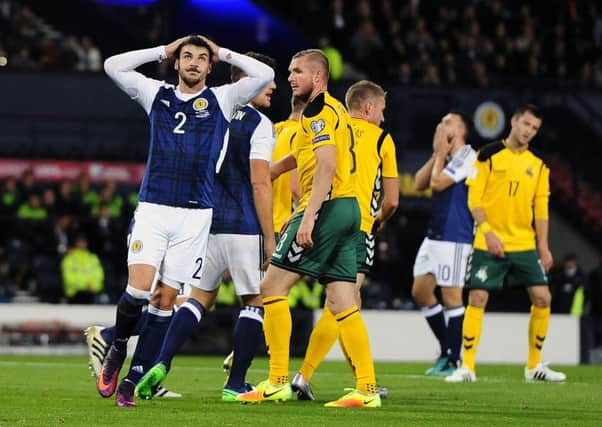Improvements came too late to save Scotland's campaign


Scotland finished by winning the point the manager might well have calculated at the start of the group would be enough to take Scotland into a play-off. A scoring draw in a venue where Slovenia had not conceded a goal in four previous qualifiers is a good result. But it was of no consequence in the end to Scotland, who learned Slovakia had usurped them as runners-up in Group F.
No one can look back and claim Scotland’s failure was down to a night in Ljubljana when they scored twice and held a team with their own reasons to be hell bent on securing victory. Dropped points at home to Lithuania were Scotland’s undoing, as were the lax moments when gifting Harry Kane a 94th-minute equaliser against England in June. Scotland left themselves with too much to do; a fourth World Cup qualifying victory in a row proved just beyond them. That it would have been the first time they had managed such a feat underlines how hard it is to accomplish.
Advertisement
Hide AdAdvertisement
Hide AdAs happened in the last campaign, Scotland were left ruing games, and moments, earlier in the group. The 3-0 hammering by Slovakia a year ago is another more sound entry for the charge sheet. But even then Scotland started well before being wounded by a goal stemming from a foul Strachan still protests should have been given in favour of Steven Fletcher. They collapsed thereafter, collecting their equal highest defeat in the group.
The six goals lost against Slovakia and England have proved disastrously costly. Scotland missed out on second place on goal difference. Slim margins, once again.
But there’s been more compelling evidence of a developing team this time around. Possibly this is why it smarts more. Not everyone will be sticking around, of course. There’s an expectation that Scott Brown will announce his international retirement, on a permanent basis this time. Darren Fletcher, at 33, is another who will be pondering what to do. He was among Scotland’s better players last night but loyal though he is to the cause, his first instinct will be to try and prolong his English Premier League career. But there are others ready to step into the fray, such as Hibs’ John McGinn, an unused sub again last night.
Strachan is often cast as stubborn, unwilling to change. But he responded to the rising clamour to give Leigh Griffiths a run of games and has been rewarded with four goals. The Celtic striker was a significant reason why Scotland catapulted themselves back into the qualifying equation.
Some might well ask why Strachan didn’t turn to him earlier. Griffiths was a substitute on that night when Scotland were held by Lithuania, then ranked 117 in the world.
When Scotland tried to undo some of the damage against the same side last month, only one of the starting XI played in that earlier meeting, Andy Robertson. So Strachan has tried to change things. There is evidence of something coming together. Just not fast enough, sadly.
Strachan was being non-committal about his future last night. It wasn’t perhaps the time or place for a deeper analysis of Scotland’s failings. But he tried one anyway.
It went beyond what he could do as manager and what the players could do. He pointed out that he didn’t believe any player in the Slovenia side bar one, Josip Ilicic, was better technically than their Scotland counterpart. However, physically Scotland were second best all over the pitch.
Advertisement
Hide AdAdvertisement
Hide Ad“What I do know is that genetically we are behind. In the last campaign we were the second smallest behind Spain,” he said. “That means that I had to pick a team tonight to try and combat their height and strength.
“Even at that, we couldn’t combat their height and strength at set plays. Genetically, we have to work at things. It is a problem for us. We have to fight harder for every ball and jump higher because it is easier for these type of guys.
“Nobody can tell me their technique, apart from one player, is better than any of ours. Physically, we have a problem against the teams we have faced in the last couple of years. We seem to be able to fight it and battle it and get through just on sheer determination and skill and workrate and that takes a lot out of you. That is what has happened tonight. These guys have put so much into this. I really do feel for them. But they can also feel really pleased with themselves.”
Strachan’s point is that it wasn’t last night’s set of players who were to blame for the failure to qualify, or reach the play-offs at least. They had helped manoeuvre Scotland back into a position where they were so close to realising their aims. A 2-2 away draw against tricky opponents would normally be a result to savour. But instead it drew only muted applause form the Tartan Army, who again, it must be said, provided stout backing in Slovenia. Their response might be key to Strachan’s decision about whether to stay on or not.
The manager refused to beat himself up for last night’s tactical alterations and substitutions. It would be ridiculous to criticise Strachan too harshly after a run of games where he has been vindicated in his selection choices. Few queried his decision to play both Griffiths and Chris Martin from the start, for example.
“What you have to do is analyse,” said Strachan. “You could say: ‘Och, you don’t use that system!’ But it is only a theory. We don’t know if that means we are going to win. I am the only one that puts the theories into practice.
“You don’t know if it would have made a difference if you had played another system or another player. It might have been a lot worse. Nobody will ever know.”